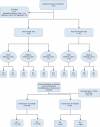Pregnancy outcomes among women born in Somalia and Sweden giving birth in the Stockholm area - a population-based study
- PMID: 32744184
- PMCID: PMC7480426
- DOI: 10.1080/16549716.2020.1794107
Pregnancy outcomes among women born in Somalia and Sweden giving birth in the Stockholm area - a population-based study
Abstract
Background: Studies report that women born in some African countries, after migrating to the Nordic countries, have worse pregnancy outcomes than women born in the receiving countries. With the aim of identifying unmet needs among Somali-born women, we here study this subgroup.
Objective: We compared pregnancy outcomes among women born in Somalia to women born in Sweden. Further, we investigated whether the proactive maternal observation of fetal movements has effects on birth outcomes among women born in Somalia.
Methods: In Stockholm, half of the maternity clinics were randomized to intervention, in which midwives were instructed to be proactive towards women by promoting daily self-monitoring of fetal movements. Data for 623 women born in Somalia and 26 485 born in Sweden were collected from a population-based register.
Results: An Apgar score below 7 (with stillbirth counting as 0) at 5 minutes was more frequent in babies of women born in Somalia as compared to babies of women born in Sweden (RR 2.17, 95% CI 1.25-3.77). Babies born small for gestational age were more common among women born in Somalia (RR 2.22, CI 1.88-2.61), as were babies born after 41 + 6 gestational weeks (RR 1.65, CI 1.29-2.12). Somali-born women less often contacted obstetric care for decreased fetal movements than did Swedish-born women (RR 0.19, CI 0.08-0.36). The differences between women born in Somalia and women born in Sweden were somewhat lower (not statistically significant) among women allocated to proactivity as compared to the Routine-care group.
Conclusions: A higher risk of a negative outcome for mother and baby is seen among women born in Somalia compared to women born in Sweden. We suggest it may be worthwhile to investigate whether a Somali-adapted intervention with proactivity concerning self-monitoring of fetal movements may improve pregnancy outcomes in this migrant population.
Keywords: Apgar score; Fetal movements; Mindfetalness; awareness of fetal movements; stillbirth.
Conflict of interest statement
No potential conflict of interest was reported by the authors.
Figures
References
-
- Gagnon AJ, Zimbeck M, Zeitlin J, et al. Migration to western industrialised countries and perinatal health: a systematic review. Soc Sci Med. 2009;69:934–11. Epub 2009/08/12. PubMed PMID: 19664869. - PubMed
-
- Socialstyrelsen . Socioekonomiska faktorers påverkan på kvinnors och barns hälsa efter förlossning. 2016. [cited 2019 January28]. Available from: file:///H:/Artiklar/Socialstyrelsen/Socioekonomiska%20faktorer%20risk%20...
-
- SCB . Statistiska centralbyrån. 2019. Available from: https://www.scb.se
-
- Saastad E, Vangen S, Froen JF.. Suboptimal care in stillbirths - a retrospective audit study. Acta Obstet Gynecol Scand. 2007;86:444–450. Epub 2007/05/09. PubMed PMID: 1748646. - PubMed
Publication types
MeSH terms
LinkOut - more resources
Full Text Sources


